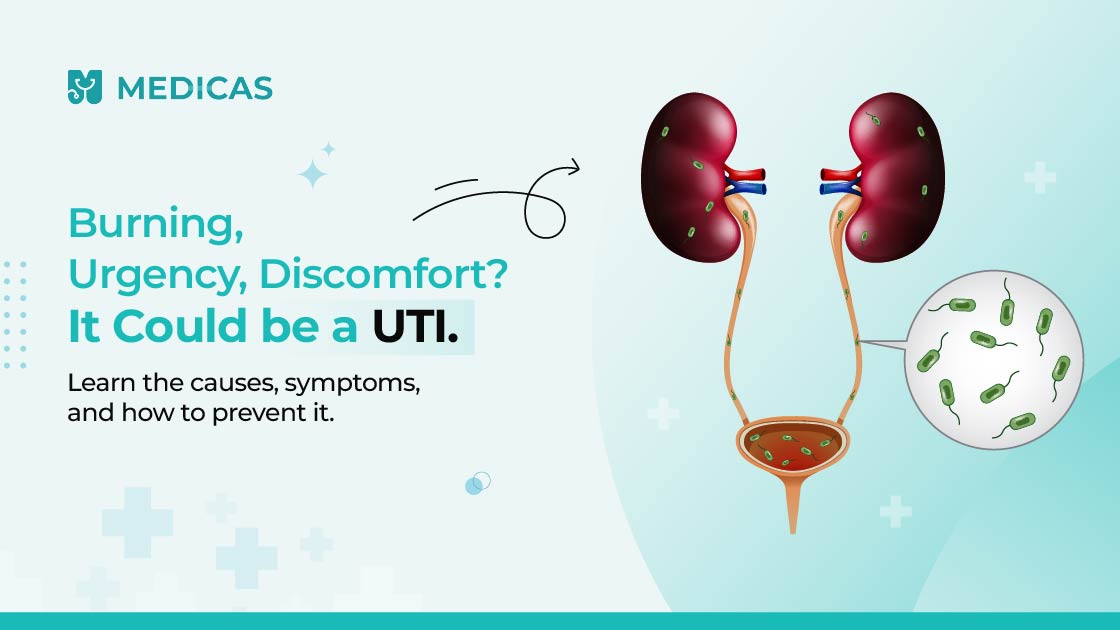In India, urinary tract infection or (UTIs) are one of the most frequently diagnosed bacterial infections, particularly among women. According to recent health data, nearly 50% of Indian women will experience a UTI at least once in their lifetime, and many will face recurrent episodes. Despite their prevalence, UTIs are often misdiagnosed or mistreated due to stigma or lack of awareness. As a general practitioner, I’ve seen firsthand how prompt diagnosis and preventive care can significantly reduce discomfort and complications. In this blog, I’ll walk you through everything you need to know—from causes to treatment, prevention tips, and when to seek medical help.
What is a Urinary Tract Infection (UTI)?
A urinary tract infection is a bacterial infection that affects any part of the urinary system—namely the kidneys, ureters, bladder, or urethra. Most commonly, it involves the lower urinary tract: the bladder and urethra. UTIs can be painful, uncomfortable, and, if left untreated, potentially serious.
How Common Are UTIs?
UTIs are among the most common infections globally and in India. Women are disproportionately affected due to anatomical reasons, but men, children, and the elderly are also at risk. It’s estimated that UTIs make up nearly 25% of all bacterial infections in women.
Who Is at Risk for UTIs?
You might be more prone to a UTI if you:
- Are female
- Are sexually active
- Are pregnant
- Have diabetes
- Use urinary catheters
- Have kidney stones or structural abnormalities in the urinary tract
- Are postmenopausal
Types of Urinary Tract Infections
- Cystitis: Involves the bladder
- Urethritis: Affects the urethra
- Pyelonephritis: Involves the kidneys, and can be more severe
Common Causes of UTIs
Urinary tract infections typically begin when bacteria enter the urinary tract through the urethra and begin to multiply in the bladder.
Bacterial Infections
The primary culprit is Escherichia coli (E. coli), a bacterium normally found in the digestive tract. Occasionally, other bacteria like Klebsiella or Enterococcus may be responsible.
Poor Hygiene Habits
Not wiping front to back, wearing tight or non-breathable undergarments, and skipping regular bathroom breaks can create a breeding ground for bacteria.
Sexual Activity and UTIs
Sexual intercourse can facilitate the transfer of bacteria into the urethra. This is especially common in women, making UTIs more frequent in sexually active females.
Recognising the Symptoms of a UTI
Early diagnosis can help prevent complications. Let’s explore the signs that warrant attention.
Early Signs You Shouldn’t Ignore
- Urgency to urinate even when the bladder is nearly empty
- Burning sensation during urination
- Cloudy or foul-smelling urine
- Mild pelvic or lower abdominal pain
Symptoms in Men vs. Women
In women, symptoms are often more prominent—pelvic pain, vaginal discomfort, and urgency. Men might feel rectal discomfort or experience difficulty urinating.
When to Consult a Doctor
If your symptoms persist beyond 48 hours, worsen, or include fever or blood in urine, it’s best to seek medical attention. You can book a lab test or an online appointment to begin treatment early.
How UTIs Are Diagnosed
When you visit a doctor, they’ll typically perform a urinalysis to check for infection. If you’re using an online consultation platform, your doctor might guide you on how to provide a sample or recommend a local lab.
Diagnostic Tests for UTIs
- Urinalysis: Checks for bacteria, white blood cells, and nitrates.
- Urine culture: Helps identify the specific bacteria causing the infection.
- Imaging tests: Needed for recurrent UTIs or when kidney involvement is suspected.
Online Consultations for UTI Symptoms
Not sure if you should visit a clinic? Online doctor consultations are a convenient way to get personalized guidance, prescriptions, and even referrals for lab tests if needed.
Treatment Options for UTIs
UTIs are usually straightforward to treat with antibiotics, but supportive care and lifestyle changes can enhance recovery and reduce recurrence.
Common Antibiotics Used
- Nitrofurantoin
- Fosfomycin
- Trimethoprim/Sulfamethoxazole
- Ciprofloxacin (for more severe or complicated infections)
Your doctor will select the best antibiotic based on your age, medical history, and the bacteria identified.
Home Remedies and Supportive Care
In addition to antibiotics:
- Drink at least 2–3 liters of water per day
- Use heating pads for pelvic pain
- Avoid caffeine, alcohol, and spicy foods during infection
You can find more home remedies for UTIs and wellness tips on our blog.
Preventing UTIs: Habits That Help
Prevention plays a key role, especially if you’ve had UTIs in the past.
Importance of Hydration
Water dilutes urine and helps flush bacteria from the urinary tract. Aim for clear or light-yellow urine as a hydration benchmark.
Wiping Techniques and Hygiene
- Always wipe front to back
- Use gentle, fragrance-free soap
- Avoid douching or harsh feminine products
UTI and hygiene are tightly linked, especially in women, so maintaining genital cleanliness is essential.
Urination Habits and Prevention
- Don’t hold in urine for long periods
- Empty your bladder fully each time
- Urinate before and after sexual activity
UTI Complications: When It Becomes Serious
Ignoring a urinary tract infection can lead to serious complications like kidney infections, abscesses, and in rare cases, sepsis.
When to See a Specialist
You may need a specialist if:
- You’ve had three or more UTIs in a year
- You’re pregnant and have a UTI
- Symptoms worsen despite taking medication
Urinary tract infection during pregnancy requires prompt attention. Left untreated, it could lead to premature birth or low birth weight.
Conclusion
UTIs may be common, but they’re not to be taken lightly. Whether it’s your first infection or one of many, timely treatment and preventive steps can protect your long-term health. Recognise the symptoms, seek professional help early, and don’t ignore hygiene. Need expert care? Book a consultation online, consult with me, or schedule a lab test today.
Frequently Asked Questions
- What are the early signs of a urinary tract infection?
A burning sensation while urinating, frequent urge to urinate, and cloudy urine are some of the earliest signs.
- Can I treat a UTI without antibiotics?
While hydration and home remedies may help with very mild symptoms, most UTIs need antibiotics to prevent complications.
- How can I book an online doctor appointment for a UTI?
Visit Medicas Online Consultation or book an appointment here.
- Is online consultation effective for urinary tract infections?
Absolutely. Online doctors can assess symptoms, recommend tests, and prescribe antibiotics—all from the comfort of your home.
Disclaimer
Medical Advice: The information provided in this blog post is for educational purposes only and should not be considered as a substitute for professional medical advice, diagnosis, or treatment. Always consult with a qualified healthcare professional for personalized guidance regarding your specific medical condition.
Accuracy of Information: While we strive to provide accurate and up-to-date information, the field of medicine and viral fevers is constantly evolving. The content in this blog post may not reflect the most current research or medical guidelines. Therefore, it is advisable to cross-check any information provided with reliable sources or consult a healthcare professional.
Individual Variations: The symptoms, causes, treatment options, and preventive measures discussed in this blog post are general in nature and may not apply to everyone. It is important to remember that each individual’s situation is unique, and personalized medical advice should be sought when making healthcare decisions.
External Links: This blog post may contain links to external websites or resources for additional information. However, we do not endorse or have control over the content of these third-party websites. Accessing these links is done at your own risk, and we are not responsible for any consequences or damages that may arise from visiting these external sources.
Results May Vary: The effectiveness of treatment options or preventive measures mentioned in this blog post may vary from person to person. What works for one individual may not work the same way for another. It is essential to consult with a healthcare professional for personalized advice tailored to your specific needs.



